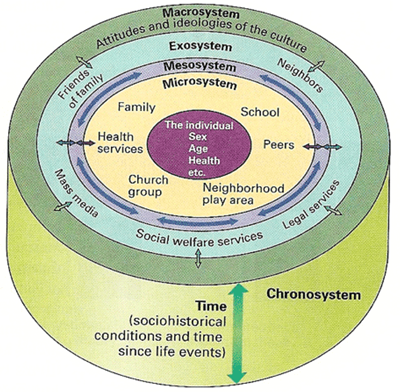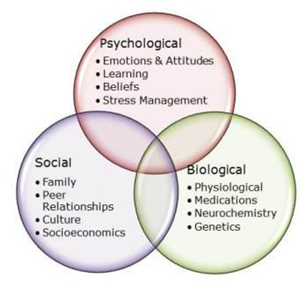Lesson 8: Behaviors Across the Lifespan - Across Our Career Paths
Attention

This figure describes one of the most popular of the Developmental Theories...the Ecological Theory of Urie Brofenbrenner.
Learning Outcomes
Upon completion of this lesson's material, students will be able to:
- Describe human behavior and development across biological, social, psychological, and cultural systems.
- Describe the impact of social and economic forces on individuals across the life span.
- Compare various theoretical models of human behavior and evaluate their relevance for comprehending human development when working with diverse individuals, families, groups, and communities.
- Understand cultural diversity as a factor in human development, including racial, ethnic, gender, and sexual orientation differences.
Teaching
Summary was found on brainmass.com: Data has been presented that points to observable differences in cognitive abilities and behavioral development during the early child years, beginning with preschool, for some minority groups; and White and middle-class students.
Based on several reports [including the Children of the National Longitudinal Study of Youth 79 (CNLSY79); the U.S. Dept.; and Early Childhood Longitudinal Kindergarten (CLS-K); and of Labor (as cited in Fargas, 2003)] statistics show that African American, Latino and American Indian students are lacking behind White and middle-class students. Farkas's (2003) study highlights the racial disparities and racial discrimination that exist between these groups. Could there be biases within these tests? What are your thoughts?
Review this youtube.com video a recent series of replicated studies from Kenneth and Mamie Clark's seminal work, in 1940, regarding racial disparity:
Click HERE to view this directly on YouTube
Culture, race, socio-economic class, gender, sexual orientation, age, etc. are all factors playing a role in a student's ability to learn, [and educators/employers ideas about what can be learned] and can be used to justify the need for attention to career counseling across the life span by career counselors.
Farkas offers the explanation that learning is a cumulative process; the learning that takes place during specific periods of a child's life is critical to or her progress in school. For instance, he asserts that the performance gap between Black students and White, middle class students remain from Grade 1 thru 12. Other research focused on developmental theories and learning found that the first five years of life were crucial for cognitive and behavioral development. According to Linderberger, & Baltes (2000), the development of the mind is described as lifelong, multi-dimensional, and multi-functional.
Click HERE to view this directly on YouTube
Theories have emphasized aspects of career behavior, that attempt to assess and predict the types of activities, school subjects, or career fields that form the basis for people's educational/vocational interests and career choices – ASVAB and personality inventories such as the Myers-Briggs Personality Inventory, are popularly used to assist organizations with determining the employees that may be a proper "fit" within the organization or job needs.
Social cognitive career theory (SCCT) may lend itself to the study of many processes regarding career behavior, including such issues as how people manage normative tasks and cope with the multiple challenges involved in career preparation, entry, adjustment, and change, regardless of the specific educational and occupational fields they occupy.
In addition to the assessments and typologies available, career decision making/exploration, job searching, career advancement, negotiation of work transitions and multiple roles are significant aspects to consider when entering a new position or career.The bio-psycho-social model is an important overlay of the theories described above. What factors may influence behavior, and how?? This framework allows us to understand the various realms of influence in our own and others' behavior.

Consider this...what are some factors from each sphere of influence that you have observed in yourself or others?
Assessment
Lesson 8 Discussion A
Take this free version of a Myers-Briggs typology- post your type (four letters with explanation) to the discussion board and thoughtfully discuss the results of your own experience. Don't forget to comment on others' posts, as well.
Lesson 8 Discussion B
After watching the videos within the lesson, post your observations regarding the content of the talk & experiments within the corresponding discussion section.